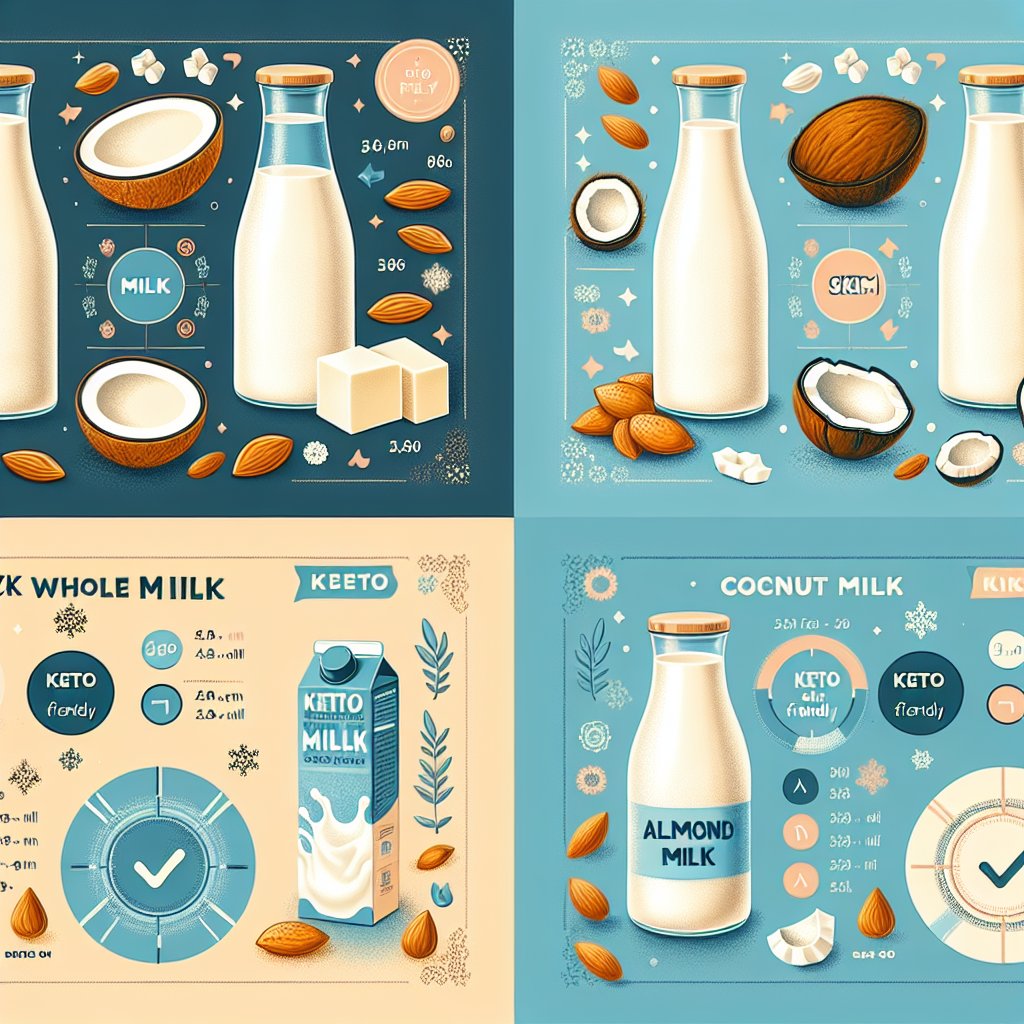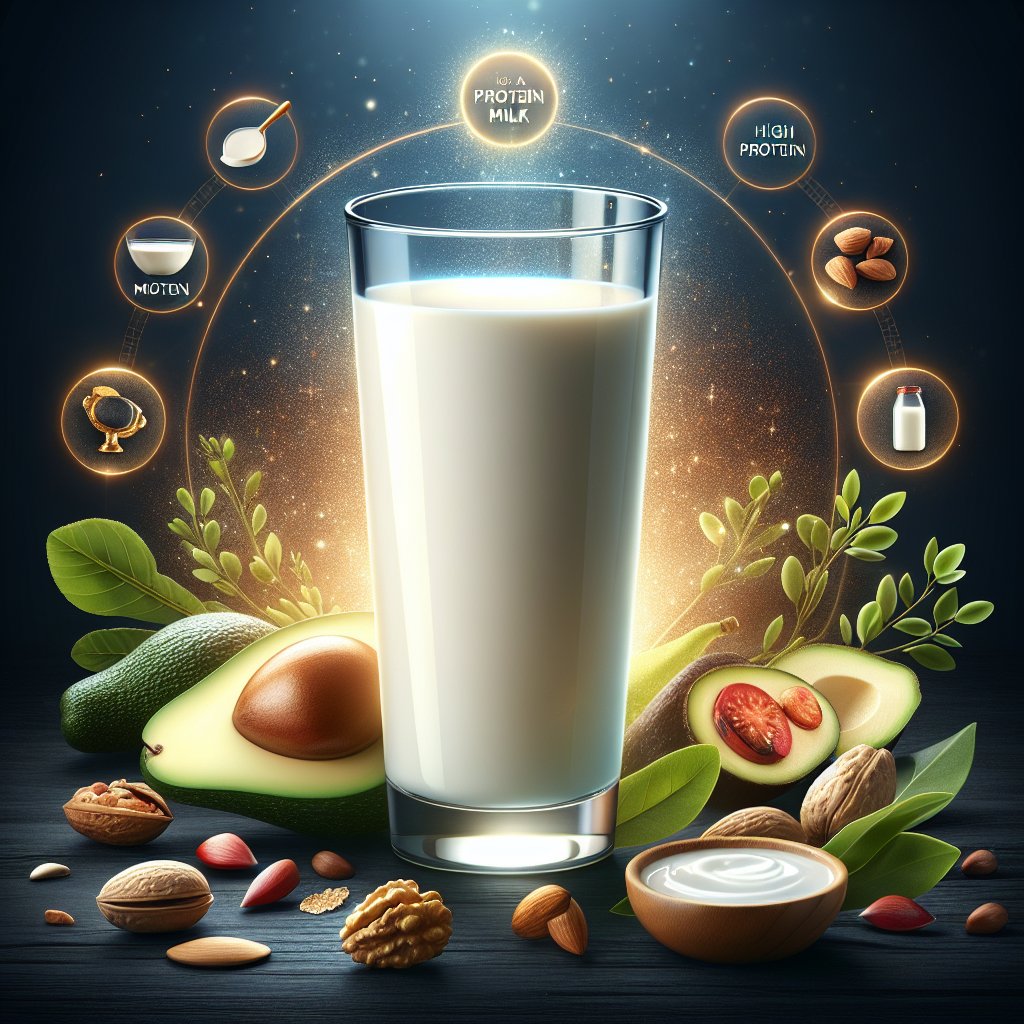Discover the Best Keto-Friendly Milk Choices for Your Low-Carb Diet – What Milk is Keto Friendly?
Explaining the Popularity of the Ketogenic Diet and the Importance of Choosing Keto-Friendly Foods
Hey there, keto enthusiasts! If you’re curious about the ketogenic diet and want to know more about the best keto-friendly milk choices, you’ve come to the right place. The ketogenic diet has been gaining popularity in recent years, and it’s no wonder why. Not only is it an effective way to shed those extra pounds, but it also offers a range of health benefits. Let’s dive into why the keto diet has captured the hearts and taste buds of so many people.
The ketogenic diet is a low-carb, high-fat diet that offers a unique approach to weight loss and overall well-being. By drastically reducing your carbohydrate intake and replacing it with healthy fats, your body enters a state of ketosis. This metabolic state is where your body becomes incredibly efficient at burning fat for energy, leading to weight loss and improved energy levels. But the benefits don’t stop there – many people report reduced cravings, clearer thinking, and better blood sugar control when following a ketogenic lifestyle.
The Popularity of the Ketogenic Diet
So, why has the ketogenic diet become so popular? Well, for starters, it’s highly effective for weight loss. Many individuals have found success in achieving their weight loss goals through this approach. Furthermore, the diet’s ability to help regulate blood sugar levels has made it a popular choice for those with type 2 diabetes or insulin resistance.
Moreover, the ketogenic diet offers delicious and satisfying meals, from creamy soups to indulgent desserts, making it easier for people to stick to a healthy eating plan. The flexibility and creativity involved in cooking keto-friendly foods have attracted many individuals looking for a sustainable way to eat healthily.
Importance of Choosing Keto-Friendly Foods
Now, let’s talk about the importance of choosing keto-friendly foods. Embracing a ketogenic lifestyle isn’t just about cutting carbs; it’s also crucial to select the right kinds of foods to support your body’s nutritional needs while staying within your daily carb limits.
When it comes to the ketogenic diet, not all foods are created equal. To maintain ketosis effectively, it’s essential to choose foods that are low in carbohydrates and high in healthy fats. As a result, keto-friendly foods typically include meat, fish, eggs, nuts, seeds, and low-carb vegetables. Dairy products can also be a part of a keto meal plan, but it’s crucial to select options that are low in carbs and high in healthy fats.

What is the Ketogenic Diet?
Before we dive into the world of keto-friendly milk options, let’s talk about the ketogenic diet. You might have heard about it from friends, seen it on social media, or read about it in magazines. But what exactly is the ketogenic diet?
The ketogenic diet, or keto diet, is a low-carb, high-fat eating plan that offers various health benefits. It involves drastically reducing your carbohydrate intake and replacing it with healthy fats. This reduction in carbs puts your body into a metabolic state called ketosis, where your body becomes incredibly efficient at burning fat for energy. It also turns fat into ketones in the liver, which can supply energy for the brain.
One of the key principles of the ketogenic diet is to consume foods that are low in carbohydrates and high in healthy fats. This means saying “hello” to low-carb, high-fat foods like milk, which brings us to the next point – the importance of choosing the right keto-friendly milk.
Nutritional Profile of Milk
When it comes to the ketogenic diet, understanding the macronutrient content of different milk varieties is essential in making the right choices. Let’s delve into the macronutrient breakdown of milk, including carbs, fats, and proteins.
Carbohydrates
Milk contains lactose, a natural sugar that contributes to its carbohydrate content. However, the carb content varies across different types of milk. For instance, a cup of whole milk contains around 12 grams of carbs, while the same amount of almond milk contains only 2-3 grams of carbs, making it a keto-friendly option.
Fats
Full-fat dairy milk is rich in saturated fats, providing approximately 8 grams of fat per cup. The high-fat content makes it suitable for a keto diet, as fats are a primary energy source and help keep you satiated. On the other hand, alternative milk options like coconut milk and macadamia nut milk also offer healthy fats, making them favorable choices for those following a low-carb, high-fat diet.
Proteins
Milk is a good source of high-quality proteins, containing essential amino acids vital for various bodily functions. A single cup of cow’s milk typically provides around 8 grams of protein. Additionally, some plant-based milk alternatives such as soy milk offer a comparable protein content, making them suitable for individuals seeking non-dairy protein sources while adhering to a ketogenic lifestyle.
Understanding the macronutrient profile of different milk types enables you to make informed decisions when selecting the best keto-friendly milk for your dietary preferences and health goals.
Types of Milk: What is Keto-Friendly?
When it comes to choosing the best milk for a keto diet, it’s important to consider the carb content and the overall nutritional profile. Let’s compare different types of milk to see which ones are the most keto-friendly.
Whole Milk
Whole milk is known for its creamy texture and rich taste. However, it is relatively high in carbohydrates, containing around 12 grams of carbs per one-cup serving. As a result, whole milk may not be the most keto-friendly option, as the moderate to high carb content could impact ketosis.
Skim Milk
Skim milk, also known as fat-free milk, is lower in fat but relatively higher in carbohydrates compared to other keto-friendly options. With around 12 grams of carbs per one-cup serving, skim milk may not align with the low-carb requirements of a ketogenic diet.
Almond Milk
Almond milk has gained popularity among those following a ketogenic lifestyle due to its low-carb content. Unsweetened almond milk typically contains only 1-2 grams of carbs per cup, making it a keto-friendly alternative to traditional dairy milk.
Coconut Milk
Coconut milk, particularly the canned, full-fat variety, is another keto-friendly option. With approximately 3 grams of carbs per one-cup serving, unsweetened coconut milk is a creamy and delicious choice for those on a low-carb diet.
When it comes to choosing the most keto-friendly milk, almond milk and unsweetened coconut milk are the clear winners due to their significantly lower carbohydrate content compared to whole and skim milk.
It’s important to note that flavored varieties of almond and coconut milk may contain added sugars, which can increase the carb count. Always opt for unsweetened versions to ensure you’re staying within your keto macros.
Ultimately, the keto-friendliness of milk depends on its carbohydrate content. Almond milk and unsweetened coconut milk are great choices for those adhering to a low-carb, high-fat diet like keto, providing a creamy, nutritious base for many recipes and drinks.

Carb Content in Milk
When it comes to ketosis, understanding the impact of carbohydrates in milk is crucial for making informed choices. Milk generally contains lactose, a type of natural sugar found in dairy products. This lactose content affects the carb count in milk. Research has shown that 1 cup of whole milk contains around 12 grams of carbohydrates, while 1 cup of skim milk contains approximately 11 grams.
While milk is a fantastic source of nutrients, including calcium and Vitamin D, the carb content is a concern for those following a ketogenic diet. The aim is to keep carb intake low to enter and maintain ketosis, a metabolic state where the body uses fat for fuel instead of carbohydrates.
So, what does this mean for your keto journey? It’s vital to choose low-carb milk options that will not derail your efforts to stay in ketosis.
Embracing the Role of Fats in Milk on a Keto Diet
When it comes to following a ketogenic diet, the emphasis on consuming healthy fats is paramount. Milk, a staple in many households, offers various options for those looking to maintain a low-carb, high-fat lifestyle. To understand the role of fats in milk for those following a keto diet, it’s important to delve into the benefits of consuming high-fat dairy products.
The Benefits of Consuming High-Fat Dairy Products
High-fat dairy products are an excellent source of saturated fats, which are essential for keto dieters. Milk and other dairy products are rich in conjugated linoleic acid (CLA), a type of fat that has been linked to various health benefits, including improved body composition and reduced risk of heart disease.
Furthermore, consumption of high-fat dairy has been associated with a reduced risk of obesity, which is often a concern for individuals on a ketogenic diet. Research published in the European Journal of Nutrition found that individuals who consume full-fat dairy products are less likely to experience weight gain compared to those who opt for low-fat alternatives.
It’s important to note that the fat content in dairy products like milk also aids in the absorption of fat-soluble vitamins such as A, D, E, and K. This means that individuals on a keto diet can benefit from the enhanced absorption of these essential nutrients when consuming high-fat dairy products like whole milk.
Additionally, the consumption of high-fat dairy products has been linked to a reduced risk of type 2 diabetes. A study published in the American Journal of Clinical Nutrition found that individuals with a higher consumption of high-fat dairy products had a 23% lower risk of developing type 2 diabetes compared to those with lower consumption.
In essence, embracing high-fat dairy products, including milk, as part of a keto diet can offer numerous benefits, ranging from improved body composition to better nutrient absorption and reduced risk of certain chronic diseases.
Discover the Best Keto-Friendly Milk Choices for Your Low-Carb Diet
Proteins in Milk
Hey there, keto enthusiasts! Today, I want to dive into the fantastic world of milk and explore its keto-friendly options. When it comes to maintaining muscle mass on a ketogenic diet, the protein content in milk plays a significant role. Let’s break it down.
You see, milk contains two primary types of proteins: casein and whey. These proteins are considered high-quality, meaning they provide all the essential amino acids necessary for muscle maintenance and growth. In fact, a single cup of milk contains around 8g of protein!
According to the Journal of the International Society of Sports Nutrition, consuming milk proteins after resistance exercise can promote greater muscle protein synthesis compared to other protein sources.
So, why is this relevant for your keto journey? Well, on a low-carb diet like keto, where the focus is on adequate protein intake to preserve lean body mass, milk can be a valuable addition to your meal plan. By including keto-friendly milk options rich in protein, you can support your muscles while staying in ketosis.
When selecting keto-friendly milk, opt for varieties with higher protein content, such as unsweetened almond milk or unsweetened soy milk. These options provide the goodness of milk proteins without the added carbohydrates, making them perfect for a low-carb lifestyle.
In the next sections, we’ll explore more about the fat content and carbohydrate levels in various milk choices to empower you with the knowledge to make the best decisions for your keto journey. Stay tuned!

Calcium and Other Nutrients in Milk
When it comes to essential nutrients, milk is a powerhouse. Let’s explore the presence of essential nutrients like calcium in milk and their contribution to overall health. And of course, we’ll find out how keto-friendly they are.
First off, we can’t overlook the significance of calcium in milk. One cup of whole milk contains approximately 276-352 milligrams of calcium, meeting around 22-28% of the daily value (DV) of this essential mineral. Calcium is not only crucial for bone health but also plays a vital role in muscle function, nerve signaling, and more.
But what about the keto factor? Well, milk does contain lactose, a type of sugar, which can contribute to the carb count. However, there are keto-friendly milk options such as unsweetened almond milk and unsweetened coconut milk, which have considerably lower carb content and can be excellent substitutes.
Besides calcium, milk offers a spectrum of other essential nutrients. For instance, it’s a good source of high-quality protein, containing all the essential amino acids needed for various bodily functions. Additionally, milk is rich in vitamins such as vitamin D, which is crucial for calcium absorption, and vitamin B12, an essential nutrient for nerve function and the formation of red blood cells.
The Verdict on Keto-Friendly Milk
So, the question remains: what milk is keto friendly? The answer lies in opting for unsweetened and unflavored varieties. Unsweetened almond milk, with just 1-2 grams of net carbs per cup, and unsweetened coconut milk, with a mere 1-2 grams of net carbs per cup, are excellent choices for those following a keto lifestyle.
These alternatives not only provide a low-carb option but also offer essential nutrients, making them fitting choices for a keto-friendly diet. It’s essential to scrutinize the nutrition labels on milk alternatives, as some may contain added sugars, thickeners, or other components that can impact their compatibility with a ketogenic diet.
When choosing milk for your keto journey, keep an eye on the carbohydrate content and prioritize those rich in essential nutrients while being low in carbs. This way, you can relish your keto-friendly milk knowing that you’re not just staying true to your diet but also nourishing your body with vital nutrients.
Best Milk Choices for Keto Diet
When it comes to the ketogenic diet, finding the right milk that aligns with the low-carb, high-fat principles can be a game-changer. Here’s a list of the best milk options that are keto-friendly:
1. Unsweetened Almond Milk
Unsweetened almond milk is an excellent choice for those following a keto diet. It’s low in carbs, with less than 2 grams of net carbs per cup, making it a great option for keto-friendly recipes and smoothies. Additionally, it is rich in vitamin E and is often fortified with essential vitamins and minerals, including calcium.
2. Coconut Milk
Coconut milk is another fantastic dairy alternative for keto followers. It’s high in healthy fats and has a creamy texture, making it a versatile ingredient for both sweet and savory dishes. Coconut milk contains lauric acid, known for its potential benefits for heart health and weight management.
3. Unsweetened Macadamia Milk
With an indulgent, buttery flavor, unsweetened macadamia milk is a delightful keto-friendly option. It is low in carbs and packed with monounsaturated fats, which can support healthy cholesterol levels – a win-win for keto enthusiasts.
4. Hemp Milk
Hemp milk is derived from hemp seeds and has a nutty taste. It’s low in carbs and high in omega-3 fatty acids, making it a nutritious choice for those on the keto diet. Moreover, it’s a good source of plant-based protein, essential for muscle repair and growth.
When selecting milk for your keto lifestyle, always check the nutrition label for added sugars and hidden carbohydrates to ensure you’re staying within your daily carb limit.
By incorporating these keto-friendly milk alternatives into your diet, you can savor creamy, satisfying beverages and dishes while staying true to your low-carb, high-fat goals.
Summarizing the Key Points About Milk and Its Keto-Friendliness
So, we’ve covered a lot of ground when it comes to milk and its keto-friendliness. Here are the key takeaways:
Choosing the Right Milk for Keto
When selecting milk for your keto diet, it’s essential to opt for unsweetened, unflavored, and full-fat varieties. This ensures that you’re avoiding added sugars and minimizing the carbohydrate content.
Keto-Friendly Milk Options
Good options for keto-friendly milk include unsweetened almond milk, coconut milk, and macadamia milk. These choices are low in carbs and can seamlessly fit into a ketogenic eating plan.
Importance of Informed Choices
It’s crucial to make informed choices when it comes to incorporating milk into your keto lifestyle. Being aware of the carbohydrate content and avoiding sneaky added sugars can make a significant difference in the success of your ketogenic diet.
Emphasizing the Significance of Making Informed Choices for a Successful Keto Diet
Choosing the right milk is just one piece of the puzzle when it comes to ensuring the success of your keto diet. By making informed choices, you’re setting yourself up for a more effective and sustainable low-carb lifestyle. When you understand the carb content and potential hidden sugars in different milk options, you empower yourself to make decisions that align with your keto goals.
Keeping a close eye on the nutritional information of the milk you consume can make a world of difference. Remember, the goal of the keto diet is to keep your body in a state of ketosis, where it burns fat for fuel instead of carbohydrates. By prioritizing keto-friendly milk choices, you’re contributing to this metabolic state and maximizing the benefits of your dietary efforts.
Conclusion
As you venture into the world of keto-friendly milk choices, remember that knowledge is power. Armed with the understanding of which milks are keto-friendly and the importance of making informed choices, you’re now equipped to confidently navigate the dairy aisle and select the best options for your low-carb lifestyle. Here’s to embracing the creaminess of keto-approved milk while staying true to your health and wellness goals!


